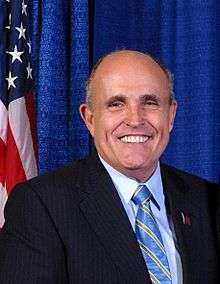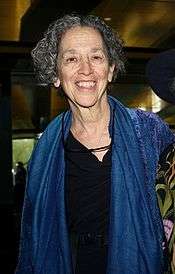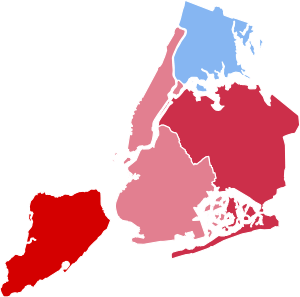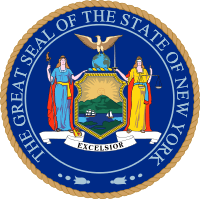New York City mayoral election, 1997
| | |||||||||||||||||||||||||
| |||||||||||||||||||||||||
| |||||||||||||||||||||||||
|
| |||||||||||||||||||||||||
| Results by Borough
Messinger—50-60%
Giuliani—50-60%
Giuliani—60-70%
Giuliani—70-80% | |||||||||||||||||||||||||
| |||||||||||||||||||||||||
The New York City mayoral election of 1997 occurred on Tuesday November 4, 1997, with incumbent Republican mayor Rudy Giuliani soundly defeating Manhattan Borough President and former New York City Council member Ruth Messinger, the Democratic nominee. They also faced several third party candidates.
History
Giuliani's opponent in 1997 was Democratic Manhattan Borough President Ruth Messinger, who had beaten Al Sharpton in the September 9, 1997 Democratic primary.[1] The results of the Democratic primary had been contested in court by Sharpton, who argued that he qualified for a run-off election with Messinger,[2] Sharpton waited until October to endorse Messinger against Giuliani, and it was perceived by some as tepid.[3]
In the general election, Giuliani also had the Liberal Party of New York line on the ballot, but not the Conservative Party of New York listing, in both respects repeating a pattern that had been established in both his successful 1993 election and his unsuccessful 1989 campaign. (In particular, the Conservative Party, which had often co-lined the Republican party candidate, broke with Giuliani in 1989.[4] Conservative Party leaders were unhappy with Giuliani on ideological grounds, citing the Liberal Party's endorsement statement that Giuliani "agreed with the Liberal Party's views on affirmative action, gun control, school prayer and tuition tax credits."[5])
Giuliani ran an aggressive campaign, parlaying his image as a tough leader who had cleaned up the city. Giuliani's popularity was at its highest point to date, with a late October 1997 Quinnipiac University Polling Institute poll showing him as having a 68% approval rating; 70% of New Yorkers were satisfied with life in the city and 64% said things were better in the city compared to four years previously.[6]
Throughout the campaign he was well ahead in the polls and had a strong fund-raising advantage over Messinger. On her part, Messinger lost the support of several usually Democratic constituencies, including gay organizations and large labor unions.[7] All four daily New York newspapers — The New York Times, New York Daily News, New York Post, and Newsday — endorsed Giuliani over Messinger.[8] Two televised debates were held, but Messinger was unable to get traction in highlighting that Giuliani was interested in higher office and might not serve out a full second term.[9] Messinger claimed that the real mayor was not in evidence during the debates: "Let me point out that we're certainly seeing the nice Rudy Giuliani tonight."[9]
In the end, Giuliani won 55% of the vote to Messinger's 43%, and became the first Republican to win a second term as mayor since Fiorello H. LaGuardia in 1941.[1] Voter turnout was the lowest in 12 years, with only 38% of registered voters casting ballots.[10] The margin of victory was not quite as large as pre-election polls had predicted;[11] analysis of the vote showed that Giuliani made modest gains in his share of the African American vote (20% compared to 5% in 1993, while benefitting from lower turnout overall) and Hispanic vote (43% from 37%) while maintaining his solid base of white and Jewish voters from 1993.[11]
In his acceptance speech, Giuliani acknowledged the image of divisiveness he had acquired during his first term and vowed to correct it: "Whether you voted for me or against me, whether you voted or didn't vote, I'm your Mayor, this is your administration. We have to do a better job of serving all of you. We have to reach out to all of you. And if we haven't, I apologize. I'm sorry and it is my personal commitment that we will try, endlessly and tirelessly, to bring all of you into the kind of success and optimism we have in this room."[10]
Less dramatically, the losing Messinger said, "Tonight, we lost a battle but the war goes on ... Our schools still don't work ... and they are still worth fighting for. We gave it everything we had."[1]
Unsuccessful candidates
Democratic Party
Results
| 1997 General Election | party | Manhattan | The Bronx | Brooklyn | Queens | Staten Island | Total | % |
| Rudolph Giuliani | Republican-Liberal | 138,718 | 81,897 | 173,343 | 176,751 | 45,120 | 615,829 | 55.2% |
| 50.9% | 43.6% | 53.3% | 64.6% | 78.6% | ||||
| Ruth Messinger | Democratic | 128,478 | 102,979 | 145,349 | 92,194 | 10,288 | 479,288 | 42.9% |
| 47.1% | 54.8% | 44.7% | 33.7% | 17.9% | ||||
| All others | 5,534 | 2,901 | 6,259 | 4,586 | 1,961 | 21,241 | 1.9% | |
| 2.0% | 1.5% | 1.9% | 1.7% | 3.4% | ||||
T O T A L | 272,730 | 187,777 | 324,951 | 273,531 | 57,369 | 1,116,358 | 100% | |
Notes:
- In the Democratic Primary, Messinger defeated Rev. Al Sharpton, avoiding a runoff election.
References
- 1 2 3 "Giuliani Wins With Ease", CNN.com, November 4, 1997.
- ↑ RACE FOR CITY HALL: THE OVERVIEW; Messinger Aims for Giuliani, and Sharpton Heads for Court - New York Times
- ↑ Sharpton and Messinger Seal Awkward Political Alliance - New York Times
- ↑ Frank Lynn, "Giuliani Files 2 Challenges To Take Lauder off Ballot", The New York Times, July 21, 1989. Accessed March 30, 2007.
- ↑ "Election 2008: Giuliani Quotes Disturb N.Y. Conservative," "National Federation of Republican Assemblies," http://www.gopwing.com/articles.aspx?article=760
- ↑ "Giuliani Approval, Satisfaction With City Hit New Highs, Quinnipiac College Poll Finds; Mayor's Lead Over Messinger Nears 2–1", Quinnipiac University Poll, October 29, 1997. Accessed June 24, 2007.
- ↑ The Last Of The Liberals - Time
- ↑ "Giuliani Goes After Voters In Messinger's Stronghold", The New York Times, October 27, 1997. Accessed June 24, 2007.
- 1 2 Adam Nagourney, "Giuliani Shrugs Off Messinger's Attacks in Debate", The New York Times, October 30, 1997. Accessed June 24, 2007.
- 1 2 Adam Nagourney, "Giuliani Sweeps to Second Term as Mayor", The New York Times, November 5, 1997. Accessed June 24, 2007.
- 1 2 David Firestone, "Big Victory, but Gains For Mayor Are Modest", The New York Times, November 6, 1997. Accessed June 24, 2007.



